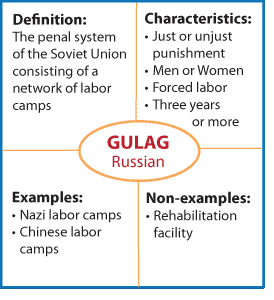After Latin, and French, the English language expanded to include words from Russian (which we covered in the last section), German, Greek, Spanish, Italian, Japanese, Sanskrit, and Yiddish, among others. The following represents a small sampling of words that have been embraced by English. Try to sound out each word and use the accompanying audio link to help you.

Source: “Schlacht um Kursk, Panzer VI (Tiger I),” Friedrich
Zschäckel, Wikipedia
Blitzkrieg
noun
Language: German (“lightning war”)
Merriam-Webster Dictionary pronunciation:
\'blits- ,krēg\
How it’s used: A chief strategy of the German military in World War II, blitzkrieg warfare strikes were sudden attacks that moved quickly and constantly and kept the enemy off-balance with no time to respond. As a metaphor, blitzkrieg is sometimes used to describe any rapid attack that, because of its speed, makes a response almost impossible.
History: Although this term originated from two German root words and described a military strategy used by Germany, the word blitzkrieg may not be a German invention; its earliest recorded use is in Time magazine in 1939.
Example: Getting into an argument with Sally is conversational blitzkrieg; she knows all my buttons, pushes them as soon as she can, and never lets me speak!

Source: “HUBRIS,” Livemont, Flickr
Hubris
noun
Language: Greek
Merriam-Webster Dictionary pronunciation:
\'hyü-brəs\
How it’s used: Hubris is a common trait of the protagonist (main character) in Greek tragedies. This character's hubris, shown through defiance or prideful actions against the gods, often results in a monumental downfall. Now hubris is used to describe arrogance, exaggerated pride, and extreme self-confidence, especially when prideful behavior leads to a downfall.
History: In ancient Greece, hubris was considered a crime. Anyone outrageously abusing wealth or power might be accused of hubris.
Example: The businessman’s failure was brought on by his hubris. He considered himself far too important to be arrested.

Source: “Karma” graphic, Eponabri, Flickr
Karma
noun
Language: Sanskrit (“actions” or “deeds”)
Merriam-Webster Dictionary pronunciation:
\'kär-mə also 'kər-\
How it’s used: A hard-to-translate word borrowed from Buddhism, karma implies “what goes around comes around,” or “do unto others as you would have them do unto you.” It assumes that good and bad acts have consequences, but we may not always experience them immediately or even in this lifetime. You might have heard of “good karma” and “bad karma”—good deeds or bad deeds that pile up a kind of energy that can come back to a person later.
History: The word karma was borrowed from Buddhism and brought to England in the 1820s by the Royal Asiatic Society. Before then, it evolved from the word for “to do” in Proto-Indo-European, the prehistoric ancestor of most European languages (including Latin, Greek, and French). Karma is echoed in the Greek-borrowed word “ceremony.”
Example: Angie believes that helping people in need will produce good karma.
Your Turn
For this next activity, the culminating activity, you will choose two words from the ones you have learned in this lesson and explore them more deeply. You will use a graphic organizer to record your answers, but first look at the following example and the word gulag.

Gulag, a Russian word, is defined as “the penal system of the Union of Soviet Socialist Republics consisting of a network of labor camps.” So if you write about gulag, your writing should contain these characteristics of the word:
- Just or unjust punishment—You might concentrate on a specific prisoner’s stories about unfair convictions.
- Men and women sent to gulags—Make sure that both genders are included in your writing.
- Basically, a type of forced labor—Include the idea that people do not have a choice when convicted and are sent to perform tough physical tasks.
- The amount of time prisoners serve—Include the idea that people are usually sentenced to three years or more of prison time.
Examples of gulags include the following:
- Nazi labor camps
- Chinese labor camps
If gulags are prison systems whose inmates are forced into hard labor, the non-examples would be other penal systems that aren't so harsh and aren’t types of labor camps. They could be modern prison systems or fair-and-just criminal systems. The non-examples must be close to the definition of a gulag but they won’t exactly match. One non-example of a gulag might include a rehabilitation facility that teaches job skills and provides counseling services.
You have now completed the lesson on the origins and meanings of foreign words and phrases. Remember that when you come across a word with a foreign origin, which is likely since a majority of the words in the English language come from Latin or French, take time to look up the origin and meaning. It may be time-consuming and distracting to your reading at first, but your knowledge and fluency will increase with practice and experience.